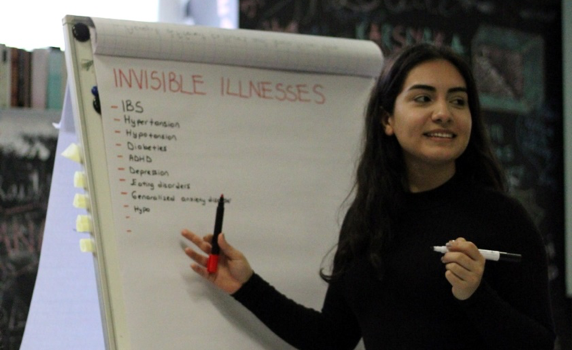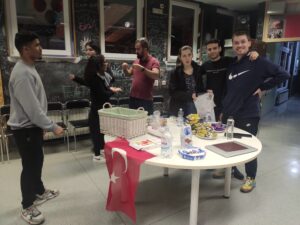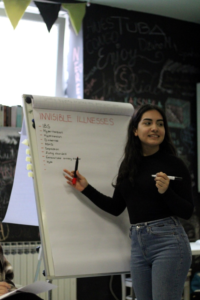
THE PROJECT ‘THE INVISIBLE’
I participated in an Erasmus+ project – training course called “The Invisible”. Regarding including young people with chronic health conditions; this project was designed to support the development of knowledge, skills, and attitudes among youth workers, leaders, project coordinators, mentors, and all others who work with young people in youth work settings. The main target of the project was the inclusion of young people with chronic health conditions in the youth projects and analyzing risk management and crisis intervention. I gained a lot of knowledge during the training about how to help members of this target group, how to make projects safer and more fun for everyone involved, and how to effectively handle risks and crises. In this report, I will review the training and talk about my learning outcomes as a participant in the project.
First, I want to begin the report by talking about my days on the project. We had nine days in total for this project. Before I arrived at the project, I was both excited and nervous. I was excited because I wanted to get out of my comfort zone and go to a country that I have never been to before and participate in a project with people I did not know before. I wanted to meet with people from different countries, learn about their cultures and improve my perspective on life. I was also curious about Croatia, and I wanted to see the country. I was nervous because I had never done something like this before. It was the second foreign country that I have ever been to other than Italy. My arrival was a difficult experience because it seemed to be canceled at the last minute and it turned out that it was just a system error. I had to talk to several people in customer service and it was stressful. Moreover, I am more of an introverted person, and participating in a project full of people I do not know was challenging for me.

The first day was our arrival day. I have been doing Erasmus in Italy; thus, I came from Italy to the project in Samobor, Croatia which is a calm, small city near Zagreb and has a great nature and with lovely people living inside. On the first day, I found a chance to visit the capital city of Croatia, ‘Zagreb’ before I arrived in Samobor. Which was very beautiful, and it was a great beginning for my first time in Croatia and my first project. On the evening of the arrival day, we arrived at Samobor and the hostel. We settled into our common room and had dinner with the participants of the project which was the first time we met each other.
The second day was the first day of the training course. We began by getting to know each other. We did energizer activities and tried to learn each other’s names. We wrote our expectations, concerns related to the project, and how we can contribute to the project. Our coordinators introduced us to the topic of the training on that day, but it was not a detailed introduction. Mostly, we learned about what we are going to do during the training course. We also did activities about team building.

On the third day, we get more into the subject of Erasmus plus and fewer opportunities. We learned about the role of youth workers, their responsibilities, the challenges they may face, the youth worker’s hat, etc. Additionally, we explored the topic of the project, invisible illnesses. We focused on understanding invisible illnesses, delving into various chronic health conditions, their symptoms, and available treatments. This comprehensive understanding of invisible illnesses enabled us to better empathize with the experiences of individuals living with these conditions. We learned about risk and crisis, risk management, and crisis intervention in youth projects.
On the fourth day, after the energizer activity, we talked about our expectations between us and young people considering we are the coordinators or group leaders. We have done more detailed group work and tried to gain a more comprehensive understanding of both at the side of the coordinators and young people with invisible illnesses.

The next day was the most difficult for me considering it had the most challenging activities for me in the project. We started to work on the phases of a project and brainstormed our ideas. Because it was the beginning of the phases, the preparation phase was the hardest for me. We continued with the implementation phase. At the end of the day, we managed to finish our group work and I felt like I was able to do something difficult and it made me feel successful. I was very happy with my group. Everybody was contributing to the assessment effectively which made the process easier for me. In the evening, we have prepared a cultural night. Unfortunately, I was not able to prepare anything for the night because I came to Samobor from Italy, but I was on the Turkish team. However, I tried to contribute to the team as much as I can. I learned a lot from other cultures thanks to that night. Everybody was prepared. They brought lots of food and drinks from their cultures, and they also explained their history to us. We also listened to music from different countries, and everybody had lots of fun. As the Turkish team, my friend brought henna from Turkey, and we prepared a henna night. It was a unique experience.
The sixth day was our break day. I had a really good time. We went to Slovenia with a small group. We rented a van, woke up early in the morning, and left Samobor. The scenic beauty and the shared experiences with fellow participants created lasting memories that I will cherish for a lifetime. This day allowed us to relax, recharge, and further strengthen the bonds we had formed during the project.
On the seventh day, we continued to implement the phases with the follow-up phase. We polished out the whole phases and presented our work to the participants of the project. After finishing risk management, we talked about crisis intervention plans. Our coordinators gave us a real story from past projects which involves a crisis, and we worked on that crisis by thinking about what to do in such a situation. These activities equipped us with essential skills to handle potential challenges and emergencies that may arise during youth projects.

On the eighth day, which was the last day of the training, we did our final evaluation of the project. We talked about our ideas and the outcomes of the project. It was emotional for all of us to say goodbye to each other because even if we did not have too much time to get to know each other, we managed to bond with others. Luckily, we were able to catch great chemistry between the group. Unfortunately, the weather was bad during the week. We could not always find a chance to go outside and discover the city during the week. But on the eighth day, the weather was good and sunny. We took this opportunity to walk around Samobor streets and discover the city.
On the ninth and final day, it was time for us to depart. We had breakfast in the morning and then left early for the airport. It was a bittersweet moment as we said our goodbyes to each other, exchanging contact information and promising to stay in touch. The bonds we had formed during the training course were strong, and we knew that the experience had brought us closer together.
To begin with the learning outcomes, during the project I thoroughly understood how the Erasmus+ programs work (because it was my first project and I did not have enough opinion about the Erasmus+ projects), and the idea of fewer possibilities. I gained knowledge about the program’s operation and how it can be used to help to include young people with chronic illnesses in the youth works. I also learned about the idea of “fewer opportunities,” which describes people or groups who encounter major barriers to engaging in social, academic, or cultural activities. I can now more effectively advocate for the inclusion of young people with chronic health illnesses in youth work settings because I have a greater grasp of these ideas.
Another significant learning outcome from the project was learning about invisible illnesses. We gained knowledge about their symptoms, treatments, etc. such as diabetes, OCD, depression, epilepsy, and others. This understanding has equipped me with insights into the symptoms, treatments, and daily challenges faced by individuals with these conditions. I will be able to help and care for people with these conditions more effectively thanks to this knowledge by creating an inclusive and supportive environment for their participation.
Developing and planning for risk management and crisis intervention was one of the training course’s most important learning outcomes. I gained knowledge on how to recognize risks, evaluate their likelihood and potential effects, and develop plans to successfully manage them. Additionally, I gained knowledge about crisis intervention, including how to react to emergencies swiftly and successfully. With these abilities, I will be able to effectively handle risks and crises and maintain participant safety in future youth work contexts, which will be extremely beneficial.
Understanding the importance of safety in youth projects was another important learning outcome for me. I gained knowledge of how to make sure everyone working on the project feels comfortable and included as well as how to establish safe surroundings for young people with chronic health conditions. I learned strategies and best practices to establish an atmosphere of comfort, understanding, and support. By prioritizing safety, I can ensure that young people feel empowered to fully engage in youth projects without concerns about their health or well-being. This information will enable me to design projects that are safer and more pleasant for all participants, including those who have ongoing medical concerns.
I discovered the value of energizer activities in training courses and other youth work settings. Energizer activities are quick and entertaining exercises made to energize and engage participants. Before training began, each day during the training course, we did energizer exercises which proved to be highly effective in energizing our minds and bodies, fostering a positive and lively atmosphere. I found that they helped me feel more energized and involved in the exercises. To keep participants interested and motivated, I will add energizer activities into my youth work programs in the future.
The project’s international environment also helped me to develop my intercultural competency and extended my perspective. I learned cross-cultural communication skills and a broader understanding of cultural diversity by interacting with individuals from various nations. We shared our traditions and discussed ideas. Discussions and exchanges of ideas with fellow participants during mealtimes, free time, and cultural nights enriched my understanding of different perspectives and life experiences. It also helped me to improve my English since I had to use that skill a lot while communicating with others, sharing my ideas, and during presentations and group works. My capacity to successfully navigate and thrive in multicultural settings has improved as a result of this international learning experience, which is essential in a world that is becoming more interconnected.
The project also gave me lots of chances to develop personally and think of my self-reflection. I pushed myself beyond my comfort zone, trying to overcome being more of an introvert. I was able to develop flexibility and adaptation through interacting with new people, adjusting to a foreign cultural setting, and overcoming challenges. These character traits are necessary for many aspects of life in addition to being helpful in youth work.
During the project, I felt like I was doing something good for both myself and others. I felt the challenge during difficult activities and after I managed to establish those activities, it made me feel better about myself. Even though I sometimes struggled with being in a crowded environment all the time and not finding a chance to be alone, it was a challenge that I had to experience to improve myself. After the project, I have been feeling motivated about participating in the Erasmus Plus projects. It was really important for me to have a great beginning participating in projects and thankfully I had that experience. I am thankful to my coordinators, our group, and the people at the hostel for being so kind and understanding.
To conclude, the “The Invisible” Erasmus Plus project – training course – was a worthwhile experience that gave me access to a variety of skills and information. I obtained an understanding of the most prevalent chronic health disorders, developed skills in risk management, and gained experience in crisis intervention. I also learned about the Erasmus+ program and the idea of “fewer opportunities.”. Moreover, I gained knowledge about the benefits of energizer exercises and the need for safety in youth programs. In my future projects working with young people, all of these abilities and knowledge will enable me to better support and care for them.

SEMIHA SELIN KUTUKCU
